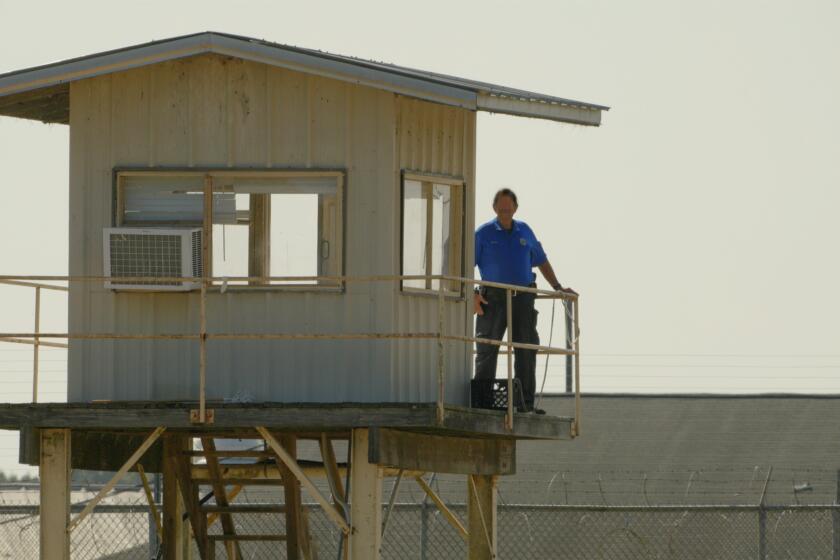Netflix embraces theatrical releases in quest for best picture Oscar. Will it be enough?
- Share via
When members of the motion picture academy’s screening committee met earlier this month, there was one coming attraction that just about everyone agreed they wanted to see: Martin Scorsese’s “The Irishman,” the Netflix-funded crime drama starring Robert De Niro, Al Pacino and Joe Pesci that will premiere at the New York Film Festival on Sept. 27.
The anticipation stemmed from Scorsese returning to a genre that has delivered classics such as “Goodfellas,” “Mean Streets” and “The Departed,” not to mention reuniting for a ninth movie with De Niro and working with Pacino for the first time.
But also this: These Oscar voters knew that they’d be seeing “The Irishman” on the big screen, a marked change from this time last year when Netflix executives were still debating a theatrical release plan for an awards slate that included Alfonso Cuarón’s “Roma” and the Coen brothers’ “The Ballad of Buster Scruggs.”
Get informed on the latest film festival events and news in LA, California, and around the world.
“Roma” became the first Netflix movie to earn a best picture Oscar nomination, going on to win three Academy Awards, including for director, cinematography and foreign language film. The streamer supported the film with a huge awards season promotional push that cost anywhere between $25 million to $50 million, the former figure proffered by Netflix and the latter by its rivals.
Those Netflix competitors who grumbled about the thousands of six-pound, $175 “Roma” coffee table books that went out to awards voters (“the shipping charges cost more than some movies’ advertising budgets,” one consultant griped) or the omnipresent “Roma” billboards blanketing Sunset Boulevard might need a handful of sedatives to get through the next six months.
Netflix owns the most ambitious awards season slate of any studio this year, premiering movies at each of the upcoming major fall film festivals — the key launchpads in the annual Oscar race. Noah Baumbach’s moving domestic drama “Marriage Story,” starring Adam Driver and Scarlett Johansson, debuts at Venice on Thursday, followed by Steven Soderbergh’s international finance comedy “The Laundromat” and David Michod’s Shakespeare adaptation, “The King,” featuring Timothée Chalamet.
Meanwhile, Fernando Meirelles’ papal chamber piece “The Two Popes,” starring Jonathan Pryce and Anthony Hopkins, is widely expected to premiere this weekend at the Telluride Film Festival. Then next week at Toronto, Eddie Murphy attempts a comeback with “Dolemite Is My Name,” a comic period piece about blaxploitation star Rudy Ray Moore. (“Laundromat” and “Popes” are also set for Toronto, as is “Marriage Story,” which is additionally tipped for Telluride.)
Netflix will cap off its fall festival premieres by opening “The Irishman” at the New York Film Festival, Scorsese’s home turf.
Netflix released on Wednesday a new trailer for Martin Scorsese’s upcoming crime drama based on Charles Brandt’s “I Heard You Paint Houses.”
Netflix also announced today that each of the six fall festival movies will open theatrically three to four weeks before being made available for streaming, attempting to appease filmmakers and academy members who still consider moviegoing to be an act of sacred worship. The releases will not be as wide as some inside the company may have hoped, however, given the major theater chains’ continued resistance.
The barrage of awards season hopefuls syncs with Netflix’s volume-heavy operation, which, under the guidance of its movie chief Scott Stuber, released 55 feature films last year, with the total climbing to nearly 90 when including documentaries and animated movies.
That bulk bolsters the company’s core streaming business at a time when competitors such as Disney and Apple are preparing to debut their own digital video sites. Disney teased its service, Disney+, which launches Nov. 12, at last weekend’s D23 Expo, showcasing new programming, a deep library and a subscription cost that’s lower than Netflix.
But Netflix’s business dilemmas, including a 12% stock dip last month when the company reported a decline in domestic subscribers, rank as background noise to the Oscar voters more concerned that the streamer plays by the same rules as everyone else.
There are many reasons “Green Book” prevailed over “Roma” at the Academy Awards this year — it was more of a comforting crowd-pleaser, there were no subtitles, it appealed to voters’ inclination for political self-congratulation — but there was no discounting a vocal contingent of old-guard members who think that Netflix movies belong at the Emmys, not the Oscars.
On Tuesday evening, the motion picture academy’s 54-member board of governors announced a handful of new rules for next year’s Oscars.
“Once you commit to a television format, you’re a TV movie,” Steven Spielberg told ITV News in March. “I don’t believe that films that are just given token qualifications, in a couple of theaters for less than a week, should qualify for the Academy Awards.”
Reading the (screening) room, Netflix broke precedent last year, releasing “Roma,” “The Ballad of Buster Scruggs” and Susanne Bier’s thriller “Bird Box” in theaters before they debuted on its site. While Netflix long had an implicit promise with its customers that they would have first access to all of its original content, some kind of exclusive theatrical window has now become far more common for many of the company’s feature films. That seismic change in strategy was announced in early November last year, after much internal discussion, with Stuber and Netflix’s in-house awards strategist Lisa Taback arguing for the shift.
“From the moment they acquired ‘Roma,’ they knew they were going to have to do things differently theatrically, to please Cuarón and to mollify academy members,” says a rival executive with knowledge of the situation. “It’s a gesture, and a smart one, even if it runs counter to their business model.”
‘Marriage Story’ trailers mark writer-director Noah Baumbach’s newest Netflix collaboration, this time starring Scarlett Johansson and Adam Driver.
“The Laundromat,” “Dolemite” and “The King” will open theatrically over three consecutive weeks beginning Sept. 27, and each will begin streaming on Netflix three weeks later.
There are slightly longer exclusive theatrical windows planned for “The Irishman,” in theaters on Nov. 1 and on the site Nov. 27, and “Marriage Story,” which opens theatrically on Nov. 6 and begins streaming Dec. 6.
“The Two Popes” is the last of the heavyweight titles headed to theaters, opening in cinemas Nov. 27 and available on Netflix beginning Dec. 20.
The scope of the films’ theatrical release remains fluid, a source close to the company says. Two of North America’s largest chains, AMC and Regal, have indicated they will not show the movies because Netflix won’t commit to the standard three-month theatrical window, which effectively squashes plans for a wide release on the scale of the biggest Hollywood titles.
Though Netflix doesn’t bank on theatrical revenue, a robust run could help offset the production and marketing costs of “The Irishman.” The Scorsese epic cost $159 million, with much of the budget going toward visual effects to “de-age” its lead actors in the movie’s early sections.
It’s likely that “The Irishman,” like “Roma” last year, will be shown primarily at independent theaters and smaller chains. Those locations can still add up. “Roma” wound up playing at more than 1,100 theaters worldwide, including about 250 across the United States — not “Black Panther” numbers, but more than Cuarón expected at the outset.
“For a black-and-white movie with the characters speaking Spanish and Mixtec, the audience was huge,” Cuarón told The Times earlier this year. “People saw it in theaters, and those without access had the chance to see it as well. And many people did both. One fed the other. And we went to the Oscars.”
Netflix is banking on a return engagement for some of this year’s crop of hopefuls come February.
More to Read
Only good movies
Get the Indie Focus newsletter, Mark Olsen's weekly guide to the world of cinema.
You may occasionally receive promotional content from the Los Angeles Times.












